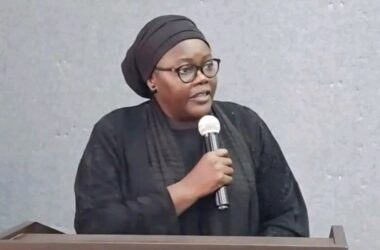By Yiep Joseph
President Salva Kiir Mayardit on Monday witnessed the swearing in of Dr. Benjamin Baak Deng Bol as Chief Justice and Laku Tranquilo Nyombe as Deputy Chief Justice, taking over the highest judicial office.
The oath-taking, at the Presidential Palace, was administered by Supreme Court Justice Dr. James Alala Deng.
In his address during the ceremony, President Kiir emphasized the importance of an independent judiciary, urging the newly appointed officials to ensure that the judiciary remains free from political interference.
President Kiir highlighted the judiciary’s critical role in maintaining stability in the country, describing it as the “foundation of justice and stability in any nation.”
He emphasized that a credible legal system is essential for peace and development.
Kiir acknowledged several concerns that have been brought to his attention, including persistent delays in court proceedings, limited access to justice, particularly in rural areas, and weak enforcement of court rulings.
He urged the newly appointed judiciary officials to focus on implementing reforms.
“The President also called on the new leadership to embark on comprehensive reforms to address all delayed and pending cases. Transparency, accountability, and the timely delivery of justice must define this new era in the judiciary,” a statement from the office the President read.
He also emphasized the importance of moral and ethical training for judges, timely salary payments, and strict measures to eliminate corruption within the legal system.
For his part, Chief Justice Dr. Baak expressed his readiness to tackle the challenges ahead, particularly the significant backlog of unresolved cases.
He appealed to the government for stronger support to address longstanding issues within the judiciary.
Last week, President Kiir removed the country’s long-serving Chief Justice and Supreme Court President in a surprise decree announced on state broadcaster SSBC. Chan Reec Madut, who had served as Chief Justice for more than 13 years, was replaced by Benjamin Baak Deng. Deputy Chief Justice John Gatwech Lul was also dismissed, with Laku Tranquilo Nyombe named as his successor.
Under South Sudan’s 2011 constitution, the president may dismiss justices under certain conditions. Article 135(2) states that judges “may be removed by an order of the president for gross misconduct, incompetence, or incapacity upon the recommendation of the National Judicial Service Commission.”
The constitution also requires Supreme Court justices to be appointed by the president “upon the recommendation of the Judicial Service Commission” and approved by a two-thirds majority in the National Legislative Assembly.
Madut was appointed by Kiir in August 2011, shortly after South Sudan gained independence from Sudan. Before his judicial role, he served as deputy chair of the Southern Sudan Referendum Commission, which oversaw the independence vote, and chaired the Southern Sudan Referendum Bureau in Juba.
Madut’s tenure was marked by persistent challenges in the judiciary, including allegations of insufficient independence from the executive branch.
Observers have noted shortages of judges, poor infrastructure, limited training for judicial staff, and ongoing concerns over corruption and political interference.




